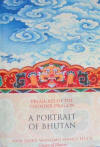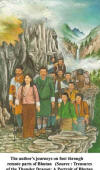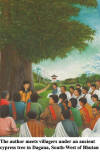|
|
the-south-asian.com November/December 2006 |
|
|||
|
Nov /
Dec Contents Real Issues Heritage
Usha
Uthup - still
Books Between
Heaven and Hell
|
|
||||
|
ON THE HIGH ROAD TO BHUTAN by Mukesh Khosla A new book Teasures of the Thunder Dragon: A Portrait of Bhutan by Her Majesty the Queen Ashi Dorji Wangmo Wangchuck, the 51-year-old India-educated Queen of the mountain kingdom of Bhutan.
Bhutan, a land of monasteries, lamas and chortens is the last surviving Mahayana Buddhist state. The pristine glory of its hills and an amazing variety of climates and ecosystems all go to make this Land of the Thunder Dragon a lifetime's experience. Measuring only 290 kilometres from north to south and 530 kilometres from east to west, Bhutan is in a time wrap. Despite the fact it hesitantly opened its doors to tourism in the 70s most inhabitants are blissfully unaware of the world around them. It is this shyness bordering on isolation that makes Bhutan so tantalizing to the itinerant tourists who want to explore the quaint mountain kingdom from close quarters. And who better to have as your guide than Her Majesty the Queen Ashi Dorji Wangmo Wangchuck, the 51-year-old India-educated Queen of Bhutan. The Queen’s love for her country starts unfolding from the first few pages of her book when she writes that her country has been identified as one of the 10-biodiversity hotspots of the world. Its eco-system has the most exotic species of the eastern Himalayas besides an astonishing variety of medicinal plants and orchids and a rich wildlife that boasts of snow leopards, golden langoors, blue sheep and the red panda. As breathtaking as its stunning natural splendour is its architecture and culture. From the gompas (monasteries) and the Dzongs (fortresses) to the religious mask dances and its folk music, Bhutan is an elevating experience says the author who travelled to far off places in her country and made detailed notes. It is these notes that form a large part of her second book Ashi Dorji made her literary debut with the book Of Rainbows and Clouds, a family history, that was published in 1999. As Queen and wife of Bhutan’s longest serving monarch Jigme Sangye Wangchuk she heads the Tarayana Foundation, which provides medical, educational and social support to people and communities living in the most remote areas of Bhutan. Back in the 60s she was among the first batch of Bhutanese students who stepped out of the country to study in a boarding school in Darjeeling. There is a twinge of nostalgia as the author recalls her days in the boarding school - experiences that the first generation of "modern and overseas" educated Bhutanese will recall wistfully. In a way the book is an account of the changes that have come about in the country after it ended its isolation.
A captivating blend of personal memoir, history, folklore and travelogue, the book peeps into the remote corners of Bhutan that are rarely viewed even by local people. It goes beyond the stereotype and describes with rare fluency the culture, customs and traditions and portrays the spiritual side of people that manifests itself in the intuitive veneration for local deities. The book also has stunning illustrations of the author’s journeys done by young Bhutanese artists who are not acknowledged by name. Writing of her husband, the monarch of Bhutan, she says, " The king’s coronation ceremony in 1974 focused the world’s attention on Bhutan. It brought the international media to our country for the first time, and photographs and articles published in international journals projected Bhutan as a fairytale kingdom ruled by a dazzlingly handsome young king…." Royal Vision The book delineates how the king has brought about an all-round development and how his royal vision has put the country on the road to growth and progress. One of his most innovative concepts has been to measure prosperity not by Gross Domestic Product but by Gross National Happiness—an index, that the author says, has become " a model for economists and planners the world over." And though she is sad to see the automobile take over from the mule and the yak as the preferred mode of transport, the old dirt track giving way to the Thimphu-Phuentsholing highway, the wooden water channels being replaced by impersonal water pipes, she says all these changes are proof of the King’s intent to see that prosperity reaches every region of the country. Even as she highlights the images of development, Ashi Dorji glosses over the rashes of corruption that are all too prevalent in the corridors of the government. But then, a good travelogue is perhaps not supposed to comment on the warts and lumps of a society in the throes of development. As a piece of writing though, Treasures of the Thunder Dragon is a great effort. *****
|
|||||
|
Copyright © 2000 - 2006 [the-south-asian.com]. Intellectual Property. All rights reserved. |
|||||



